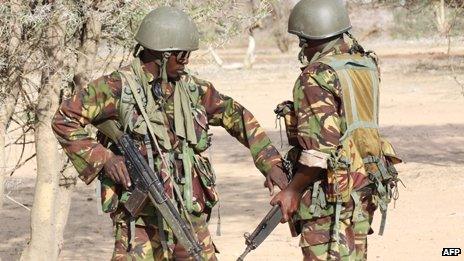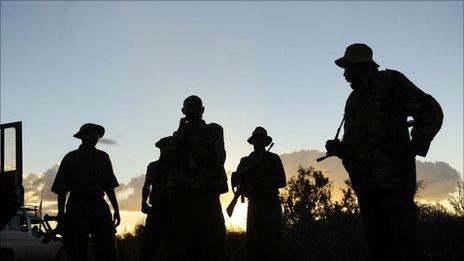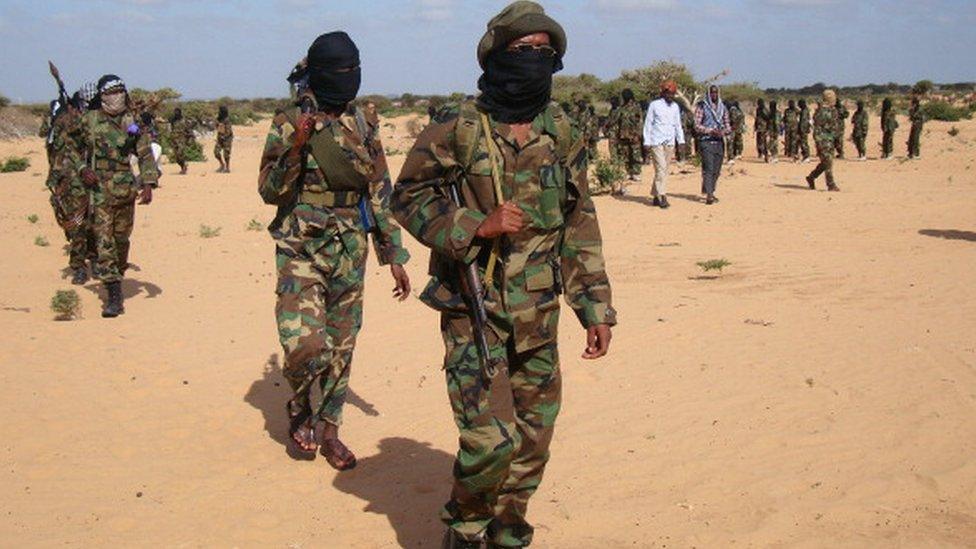A lot to lose - Kenya's Somali gambit
- Published
- comments

Questions are being asked about why Kenya's army is in Somalia
The international hotels here are starting to empty; the restaurants and bars are bringing their tables in off the streets; and a queasy, quiet sense of dread is coiling itself round Nairobi, as the country waits to see what - beyond the two grenade attacks this week - Kenya's military offensive inside neighbouring Somalia might yet provoke by way of retaliation.
Kenya's government is trying to sound confident. The deputy interior minister assured me that the country was "safe for tourists", and that foreigners have no reason to stay away despite clear threats from the militant Somali group al-Shabab.
Let us hope he is right. Kenya's vital tourism sector has fallen victim in the past to unnecessarily shrill foreign travel advisories.
But Kenya's unexpected military incursion into southern Somalia is a dramatic development for a country that has spent years carefully trying to avoid just such an entanglement.
So was it a mistake? That seems to be the main question on the lips of aid workers, diplomats and a variety of officials I have been speaking to here over the past few days.
Some Somali experts believe this was a long-planned operation, arranged with the covert support of the US and other western allies.
The theory goes that the recent kidnappings of foreigners in Kenya were merely a convenient pretext for the invasion - that al-Shabab has been fatally weakened by its "horrific ineptitude" in the face of the famine and its dwindling foreign support, and that the next few months could see the militant group ousted from its key port of Kismayo and effectively finished off inside Somalia.
A slightly more modest theory holds that Kenya has indeed been planning for a limited military intervention to build a more effective buffer zone along the border inside Somalia - where it already co-operates with various ineffective local militias opposed to al-Shabab and into which it intends to push some of the tens of thousands of Somali refugees now camped in Kenya.
A senior western aid source told me that the UN secretary general has already called Kenya's prime minister to warn him against any attempt to violate international law by expelling refugees.
Potential mistake
Then there is the chaos theory. Kenya - enraged by the kidnappings and the damage to its tourism industry and development plans - lashed out without warning or much planning, catching everyone off guard and sending its untested army into what could well prove to be a very dangerous trap.
My sense is that Kenya has been planning something for a while - but there is huge confusion about its tactics, goals and exit strategy.
At this stage, if feels like a potentially huge mistake for one of Africa's most dynamic economies.
Already there are concerns that Kenyan troops are getting bogged down by seasonal rains and struggling to re-supply.
Al-Shabab has offered little resistance so far, but that seems likely to change amid reports that the group is rushing experienced fighters to the frontlines.
If this is a trap, it could be sprung very soon.
As for the strength of al-Shabab - there's no question that an already fragmented organisation has been weakened.
But in recent weeks it has still managed to pull off a string of spectacular attacks in Mogadishu, culminating in the ambush and elimination of an entire Burundian peacekeeping platoon, which, despite official denials, appears to have caused the death of more than 60 soldiers.
Sense of dread
And what if the Kenyan offensive goes well, and Kismayo falls?
Al-Shabab may retreat but the vacuum will inevitably be filled by a wasp's nest of other clan rivalries.
Or does Kenya plan to stay on, perhaps looking for an international peacekeeping mandate?
The Ethiopians - who also pushed into Somalia in 2006 - will be watching Kenya's fortunes closely.
As for what impact all this could have on Somalia's famine - I will write about that in more detail in another blog, but the UN has already expressed concern and, with planting season at hand, it is hard to imagine how an upsurge in fighting could be anything but bad news for Somalia's vulnerable population.
- Published17 October 2011

- Published22 December 2017

- Published4 January 2018
